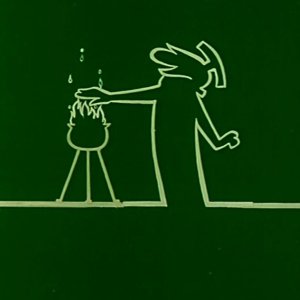"Wherever feels like home ... is home."
Having seen "Midnight University" and "Low Season", I was looking forward to a non-romance Thai-style horror comedy. Those other two titles managed to combine Thai silly humour with deeper themes of life to create something very unique.
And "Peaceful Property" did the same. I laughed, I cried, I was moved.
If we're being honest, each element of the story on its own follows a trope or two: The family backstories of two main characters, the individual ghost stories, the way the friend group meets, fights and makes up -- but then, how these are weaved together, with colourful threads of goofy humour, heart wrenching acting, consistent writing and solid editing, it's become a beautiful tapestry that tells us about family, home, (familial and romantic) love and loss. About how important it is to tell your loved ones that you love them before it is too late.
Maybe a note before I go into more detail: Thai humour, especially the silly sort you find in ghost comedies has a lot of screaming, running, is even bordering on slapstick situational comedy. If this is not to your taste, you might want to proceed with caution. If, on the other hand, you are easily scared -- this is not that sort of horror. The ghosts look mildly scary at first glance, but they are definitely not.
The writing is extremely consistent for a light comedy -- some elements and hints are shown early, and picked up in later episodes, the main villain is not quite clear from the beginning, the ghost's stories (which have only one episode to unfold and conclude) are able to build a connection with the viewers in a very short time, and ! the series remains interesting until the last minute. I'm usually bored by longer "and this is what happened after everything was resolved", which takes more than 20 minutes here, and I was not bored at all. I even paused at some points to read PangPang's live stream chat (I recommend to pay attention to the chat throughout the series, some comments are extremely funny!)
I would have liked to see a bit more criticism of the capitalist and classist society, Kan's background would make a good starting point for that. But to be honest, I did not expect it -- it's not generically part of the genre, and doesn't fit the core themes (home & family).
Without good acting, even a good script can't save a drama -- and I loved the acting here. Nobody was awkward and out of character, and within minutes of meeting a new character, I was able to connect with them.
The first episodes focus on a "ghost of the week" story while the relationship between our main characters develops in the background. It's not too on the nose, but also not too subtle how the "cases" relate to the group's story -- and some of them are picked up in the latter part of the series, which focuses on Kan's and Home's backgrounds.
The theme of "home" is both already in the name of one of the main characters ("Home") and in its title "บ้านหลอน On Sale" /baan long/, i.e. "Haunted House for Sale".
บ้าน /baan/ means both "house" (as in the building) as well as "home" (in the literal and metaphorical sense). ที่บ้าน /thii baan/ usually means "at home" but is also sometimes used for the people living "at home", i.e. the family.
If we look at the ghost stories with this in mind, they all not only take place in some sort of house, it's also always about family, about relationships between people -- some of them literally dream of owning a house.
Overall, this is one of the Thai series that can be watched by anyone. It's funny, it's heart-wrenching -- I sobbed in every episode, and often laughed just a minute later -- and it tells us to cherish the people who are ที่บ้าน, (at) home.
And "Peaceful Property" did the same. I laughed, I cried, I was moved.
If we're being honest, each element of the story on its own follows a trope or two: The family backstories of two main characters, the individual ghost stories, the way the friend group meets, fights and makes up -- but then, how these are weaved together, with colourful threads of goofy humour, heart wrenching acting, consistent writing and solid editing, it's become a beautiful tapestry that tells us about family, home, (familial and romantic) love and loss. About how important it is to tell your loved ones that you love them before it is too late.
Maybe a note before I go into more detail: Thai humour, especially the silly sort you find in ghost comedies has a lot of screaming, running, is even bordering on slapstick situational comedy. If this is not to your taste, you might want to proceed with caution. If, on the other hand, you are easily scared -- this is not that sort of horror. The ghosts look mildly scary at first glance, but they are definitely not.
The writing is extremely consistent for a light comedy -- some elements and hints are shown early, and picked up in later episodes, the main villain is not quite clear from the beginning, the ghost's stories (which have only one episode to unfold and conclude) are able to build a connection with the viewers in a very short time, and ! the series remains interesting until the last minute. I'm usually bored by longer "and this is what happened after everything was resolved", which takes more than 20 minutes here, and I was not bored at all. I even paused at some points to read PangPang's live stream chat (I recommend to pay attention to the chat throughout the series, some comments are extremely funny!)
I would have liked to see a bit more criticism of the capitalist and classist society, Kan's background would make a good starting point for that. But to be honest, I did not expect it -- it's not generically part of the genre, and doesn't fit the core themes (home & family).
Without good acting, even a good script can't save a drama -- and I loved the acting here. Nobody was awkward and out of character, and within minutes of meeting a new character, I was able to connect with them.
The first episodes focus on a "ghost of the week" story while the relationship between our main characters develops in the background. It's not too on the nose, but also not too subtle how the "cases" relate to the group's story -- and some of them are picked up in the latter part of the series, which focuses on Kan's and Home's backgrounds.
The theme of "home" is both already in the name of one of the main characters ("Home") and in its title "บ้านหลอน On Sale" /baan long/, i.e. "Haunted House for Sale".
บ้าน /baan/ means both "house" (as in the building) as well as "home" (in the literal and metaphorical sense). ที่บ้าน /thii baan/ usually means "at home" but is also sometimes used for the people living "at home", i.e. the family.
If we look at the ghost stories with this in mind, they all not only take place in some sort of house, it's also always about family, about relationships between people -- some of them literally dream of owning a house.
Overall, this is one of the Thai series that can be watched by anyone. It's funny, it's heart-wrenching -- I sobbed in every episode, and often laughed just a minute later -- and it tells us to cherish the people who are ที่บ้าน, (at) home.
Esta resenha foi útil para você?


 2
2











